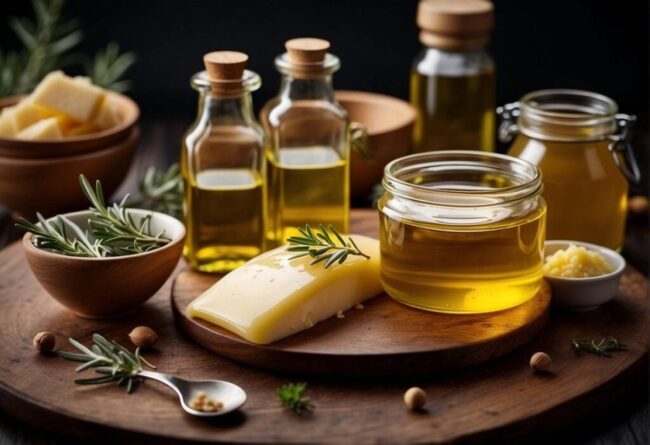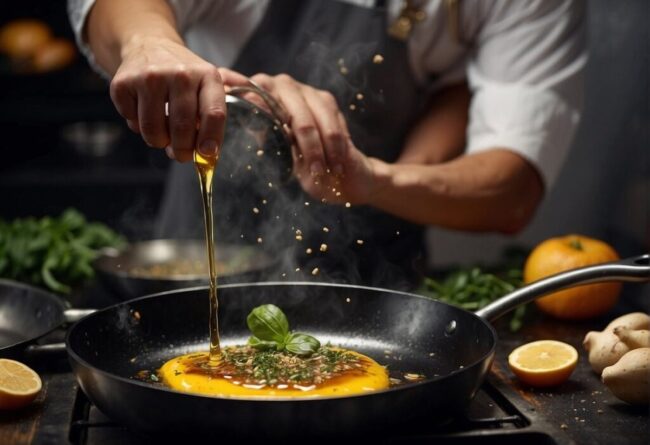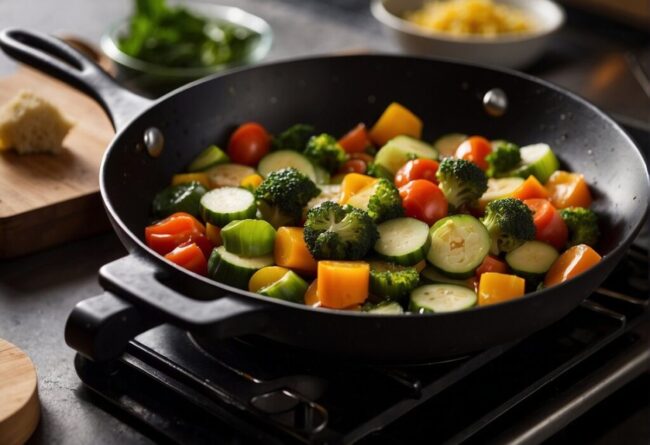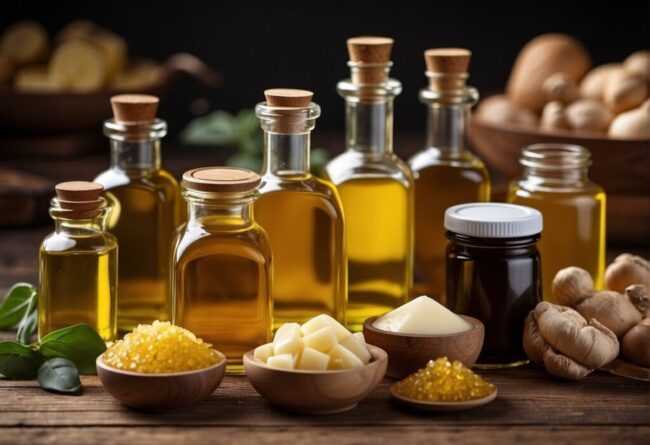11 Simple Ways to Replace Duck Fat in Recipes
Duck fat substitutes keep dishes rich and flavorful even when this ingredient isn’t available.
Some options bring the same depth, while others offer a lighter or plant-based alternative.
Whether used for roasting, frying, or adding a silky mouthfeel, the right replacement matters.
The right option brings richness without missing a step.
Understanding Duck Fat
Duck fat is a rich, flavorful cooking fat known for its high smoke point. It enhances roasted vegetables, meats, and fried dishes.
Duck Fat Benefits
Duck fat stands out with its unique blend of fats, offering a creamy texture that enhances various dishes.
Heart health benefits come from the high levels of monounsaturated fats, making it a smart choice for cooking.
Stability at room temperature is ensured by saturated fat, which keeps preparations consistent and reliable.
Cooking enthusiasts appreciate its high smoke point; this quality allows for searing and frying without fear of burning or smoking too soon.
The versatility in the kitchen invites creativity while adding rich flavor to meals you prepare at home.
Ways to Use Duck Fat
Duck fat introduces a rich and bold flavor that transforms ordinary meals into extraordinary culinary experiences.
Its luxurious texture creates an irresistible crispiness when roasting vegetables, while also bringing a delicate flakiness to pastries.
Imagine biting into perfectly roasted potatoes with a crunchy surface and light, fluffy inside; that's the magic of duck fat at work.
Using it in baked goods can elevate your favorite recipes to new heights, making them more enjoyable for every palate.
This versatile ingredient deserves a spot in your kitchen for its ability to enhance both savory dishes and sweet treats alike.
Dairy-Based Replacement Options
Dairy-based alternatives provide creamy textures and rich flavors for those avoiding traditional dairy. They work well in cooking, baking, and beverages.
Butter and Clarified Butter
Butter serves as a rich and creamy addition to many recipes.
Its lower smoke point makes it ideal for baking or low-heat cooking, ensuring dishes maintain their delicate flavors.
This dairy staple enhances everything from sautéed vegetables to smooth sauces with its luxurious texture.
Ghee, on the other hand, offers a nutty flavor and higher smoke point that caters well to various cooking techniques like frying or roasting.
Using ghee instead of duck fat is straightforward; just stick with the 1:1 ratio for seamless substitutions in your culinary creations.
Ghee or Pure Butter
Clarified butter offers a versatile cooking option that thrives in high-heat environments.
This rich fat enhances your culinary creations without masking the ingredients' true flavors.
Many chefs appreciate its ability to achieve that perfect golden crust on meats and vegetables.
The simplicity of using clarified butter as a 1:1 substitute for whole butter makes it an easy addition to any kitchen routine.
Cooking with this ingredient opens up new avenues for flavor while maintaining the integrity of your dishes.
Plant-Based Replacement Options
Plant-based alternatives for duck fat bring richness to dishes without animal products. These substitutes provide depth of flavor while catering to plant-based diets.
Extra Virgin Olive Oil
Olive oil stands out as a fantastic alternative to duck fat.
Its rich monounsaturated fats contribute positively to heart health, making it a wise choice for cooking.
When used in dishes, olive oil adds an earthy and slightly fruity flavor that elevates the overall taste.
Mediterranean recipes particularly benefit from its distinct profile, enhancing everything from salads to roasted vegetables.
Swapping in olive oil opens up exciting culinary avenues while promoting healthier eating habits.
Veggie and Sunflower Oil
Vegetable oil and sunflower oil serve as excellent substitutes in cooking and baking.
Both types of oil carry a light flavor that won’t overpower your dishes, allowing the other ingredients to shine.
High smoke points make them reliable options for frying or roasting, ensuring your food cooks evenly without burning.
Rich in polyunsaturated fats, these oils contribute to a healthier diet while maintaining versatility in various recipes.
With their neutral taste and practical qualities, incorporating these oils into meals can enhance culinary experiences effortlessly.
Coconut Oil Benefits
Coconut oil adds a delightful twist to your cooking repertoire.
This plant-based alternative offers a rich flavor profile that enhances various dishes, particularly in baking and sautéing.
Its unique texture closely resembles that of animal fats, creating an appealing mouthfeel in your meals.
Health-conscious cooks appreciate its versatility while being mindful of portion sizes due to its saturated fat content.
Experimenting with coconut oil can bring new life to familiar recipes and inspire culinary creativity in the kitchen.
Animal Fat Substitute Options
Animal fat alternatives for duck fat offer similar richness and texture for cooking. They provide flavorful options that work well in various dishes.
Goose Oil
Goose fat elevates everyday cooking with its rich flavor and versatility.
Known for achieving a delightful crispiness, it transforms roasted potatoes and vegetables into gourmet delights.
The high smoke point allows for high-heat cooking without compromising taste or texture.
Chefs appreciate its ability to enhance the natural flavors of ingredients while adding a unique depth to dishes.
Using goose fat could be your secret weapon in the kitchen, turning simple meals into extraordinary experiences that surprise everyone at your table.
Chicken and Turkey Grease
Chicken fat, often referred to as schmaltz, adds a unique depth to various dishes.
It serves as an excellent substitute for duck fat due to its comparable richness and flavor profile.
Sautéing vegetables in this golden ingredient enhances their taste significantly.
Turkey fat also makes a suitable alternative when chicken isn't accessible, offering its own distinct qualities.
Using these fats can elevate your cooking experience and introduce traditional flavors into modern meals effortlessly.
Bacon Fat
Bacon grease adds a robust smoky flavor that elevates many recipes, especially those traditionally using duck fat.
This rich alternative can transform simple dishes into something memorable, enticing your taste buds with its boldness.
Ideal for frying or sautéing, it enhances the savory notes of vegetables and meats alike.
Think about trying it in your favorite roasted potatoes or even in cornbread for an unexpected twist.
Its versatility shines when paired with hearty flavors; you’ll find new favorites as you experiment in the kitchen.
Animal Fats Explained
Lard stands out in the kitchen, especially for those flaky pastries you crave.
Its mild flavor enhances dishes without overpowering them, making it a go-to for frying.
Beef tallow shines when searing meats, bringing out their natural flavors beautifully.
With a higher smoke point, it handles high-heat cooking effortlessly.
Using these fats can elevate your meals and introduce new textures to familiar recipes, why not give them a try?
Specialty Fats and Oils List
Specialty fats and oils for duck fat provide unique flavors for different cooking styles. These options help achieve rich textures and deep taste profiles.
Margarine and Shortening
Vegetable shortening offers a unique texture in baking that many find appealing.
The high smoke point allows for frying without the risk of burning, making it perfect for various cooking techniques.
Pie crusts and pastries achieve a tender flakiness that is hard to replicate with other fats.
In contrast, margarine serves as an excellent alternative to butter while introducing its own distinct flavor profile into dishes.
With lower fat content than traditional butter, it finds utility in spreading and sautéing while still accommodating diverse culinary needs.
Specialty Fats Made Simple
Rendered specialty fats have unique properties that set them apart in the kitchen.
They offer a silky mouthfeel that enhances various dishes, especially those traditionally made with duck fat.
Butter, on the other hand, brings its own rich flavor and versatility to a wide range of recipes.
This dairy staple works wonderfully in baking and sautéing, enriching meals with its creamy essence.
Choosing between these options allows you to customize flavors while ensuring your culinary creations remain both delicious and satisfying.
Best Replacements for Duck Fat
Best replacements for duck fat include butter, lard, and olive oil. Choosing the right substitute depends on flavor and cooking method.
Substitution Guidelines
Finding an effective duck fat substitute requires careful consideration of flavor and texture.
Richness plays a significant role in dishes, so selecting a fat that mimics the savory depth of duck fat is crucial.
Look for options like olive oil or butter, which can provide both creaminess and taste while complementing your ingredients beautifully.
Cost and availability matter too; some alternatives may be easier to find or more budget-friendly than others.
Health aspects are worth examining as well since certain fats offer different nutritional benefits, ensuring you make choices aligned with your dietary preferences.
Substitute Options Comparison
Substitutes for duck fat come in various forms, each with its own strengths.
Olive oil shines when sautéing or dressing salads, offering a light flavor and health benefits.
Coconut oil provides a unique sweetness and works well in baking or frying, adding richness to dishes.
For those seeking a neutral option, canola oil serves as an excellent choice for frying without overpowering other flavors.
When considering these alternatives, convenience and dietary needs play vital roles in your cooking experience.
Cooking Without Duck Fat
Cooking without duck fat requires using fats with a similar richness. Butter, tallow, or plant-based oils can work in different recipes.
Baking with Substitutes
Butter offers a luscious richness that elevates baked goods.
Swapping duck fat for butter can enhance pastries with its creamy texture and distinct flavor.
Keeping the oven at 325°F (163°C) prevents burning, ensuring a perfect bake each time.
For heartier dishes, chicken fat adds depth while remaining flavorful and moist.
This versatility allows you to experiment in the kitchen without losing that savory essence in your recipes.
Baking and Frying
Roasting vegetables or sautéing meats can become a culinary adventure with goose fat, offering a delightful alternative to duck fat.
This rich substance lends itself perfectly to achieving that coveted crispy texture while adding depth of flavor.
When preparing roast potatoes, the transformation into golden perfection is remarkable when using goose fat instead of duck.
A careful approach on the stovetop ensures heat is evenly distributed, preventing any unwanted smoking and allowing for precise cooking control.
Elevate your meals by incorporating this flavorful fat; it’s an excellent way to enhance your dishes without compromising on taste or texture.
High-Heat Frying Techniques
Deep frying requires oils that can withstand high temperatures without breaking down.
Vegetable oil offers a neutral taste and remains stable, making it an excellent choice for deep frying.
Refined coconut oil stands out due to its impressive smoke point and subtle flavor, ideal for various dishes.
For shallow frying, olive oil shines with its health benefits and gentle taste profile, adding a hint of richness to foods.
Choosing the right cooking oil can elevate your meals while ensuring safety in high-heat preparations.
Choosing and Using Duck Fat Substitutes
Choosing and using duck fat substitutes requires understanding flavor impact. Different fats contribute distinct textures and cooking properties.
Matching Taste and Feel
Finding a suitable substitute for duck fat can elevate your cooking game.
Ghee provides a rich, nutty flavor while being excellent for high-heat applications like sautéing and baking.
Chicken fat, known as schmaltz, adds depth and richness that works well in many recipes calling for duck fat.
Goose fat delivers similar qualities with its high smoking point, making it another fantastic option when aiming for that savory profile.
For those looking to explore different flavors, beef tallow offers a robust alternative with its unique texture and taste; pork lard remains versatile due to its neutral flavor across various cooking methods.
Each choice brings something special to the table; pick one that enhances your dish!
Diet and Allergy Tips
Navigating dietary restrictions or allergies opens up a world of creative cooking options.
Coconut oil shines with its creamy texture and unique taste, making it a favorite among those seeking vegan-friendly alternatives.
Olive oil offers versatility for low-heat cooking, enhancing dishes without overpowering them.
Sunflower oil stands out when frying; its neutral flavor ensures the main ingredients remain in focus.
Adjusting quantities can help tailor your dish to match the specific characteristics of each substitute while keeping flavors harmonious.
How to Store Substitutes
Proper storage of substitutes helps preserve their quality and usability. Keeping fats and ingredients in airtight containers extends their shelf life.
Keeping Food Fresh
Understanding how to store different duck fat substitutes can help maintain their quality and flavor.
Goose fat thrives in a cool, dark environment, staying fresh for up to six months.
Schmaltz requires refrigeration and typically lasts about four months before its quality diminishes.
Lard also benefits from cold storage, with a lifespan of around six months when kept properly chilled.
For those who prefer vegetable shortening, it remains stable in the pantry for one to two years if unopened; however, regular checks for rancidity are wise.
Ghee stands out as shelf-stable and can last up to a year without refrigeration while oils like canola or olive should be stored in similar conditions, cool and dark, to avoid oxidization.
Stopping Food Spoilage
Keeping your substitutes fresh requires a few easy steps.
Storing oils in a cool, dark place helps maintain their quality.
Using airtight containers ensures that air doesn't spoil the flavor over time.
Clean utensils are essential; any contamination can lead to quicker deterioration of your oils.
Regularly checking for changes in smell or taste will help you catch any signs of rancidity early, keeping your cooking consistent and enjoyable.





